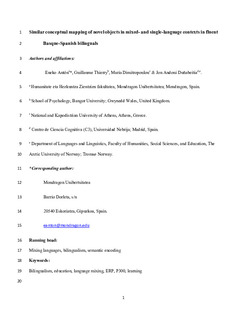Izenburua
Similar Conceptual Mapping of Novel Objects in Mixed- and Single-Language Contexts in Fluent Basque-Spanish BilingualsEgilea
Argitalpen data
2020Beste erakundeak
Bangor UniversityNational & Kapodistrian University of Athens
Universidad Nebrija
Language mixing
Bertsioa
Berrikusten dagoen preprintaDokumentu-mota
ArtikuluaArtikuluaHizkuntza
IngelesaEskubideak
© 2020, John Wiley & SonsSarbidea
Sarbide bahituaBahituraren amaiera data
2021-06-15Argitaratzailearen bertsioa
https://doi.org/10.1111/lang.12397Non argitaratua
Language Learning: A Journal of Research in Language Studies Vol. 70, nº S2, pp. 150-170Argitaratzailea
John Wiley & SonsGako-hitzak
BilingualismEducation
Language mixing
Learning
Laburpena
Participants learned the meaning of novel objects by listening to two complementary definitions while watching videos of the new object, in a single‐language context (all in Spanish) or a mixed‐langua ... [+]
Participants learned the meaning of novel objects by listening to two complementary definitions while watching videos of the new object, in a single‐language context (all in Spanish) or a mixed‐language context (one definition in Basque, one in Spanish). Then, participants were asked to assess the degree of functional relatedness between novel and familiar objects in two conditions: identical (both definitions overlap) or related (single definition overlap). Relatedness ratings differed significantly between conditions, but they were highly similar across language contexts. Furthermore, items in the identical condition elicited a P300‐like event‐related potential component, while related items elicited a wave of lesser amplitude. Critically, the amplitude differences between conditions did not differ between language contexts. No interaction was found with proficiency level across participants. In line with previous findings, we show no measurable impact of mixing languages during the establishment of a link between novel objects and existing conceptual representations in bilinguals. [-]
Sponsorship
This research has been partially funded by grant PSI2015‐65689‐P from the Spanish Government and grant PGC2018‐097145‐B‐I00 from the Agencia Estatal de InvestigaciónBildumak
- Artikuluak - Hezkuntza [135]





















